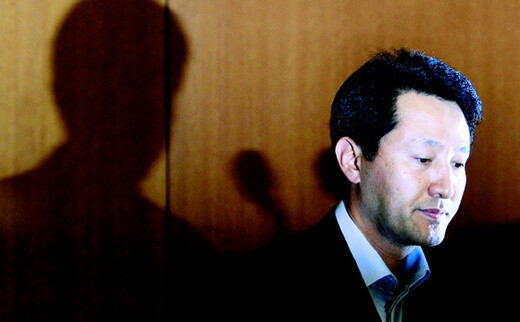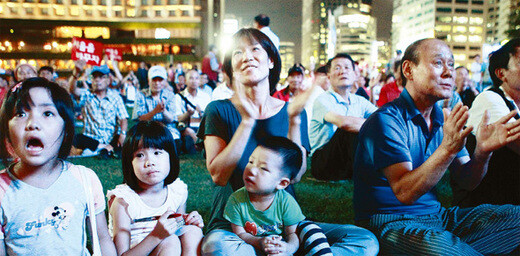hankyoreh
Links to other country sites 다른 나라 사이트 링크
Oh’s lunch referendum invalidated with 25.7 pct. turnout


By Lee Tae-hee, Staff Writer
Seoul’s Aug. 24 referendum on the provision of free school meals has come to naught after voter turnout failed to reach the 33.3 percent mark required for validity.
Seoul Mayor Oh Se-hoon, who staked his position upon the outcome of the vote, is now in a position where his resignation is imminent, a fact that adds a new and unexpected dimension to the political scene ahead of next year’s general and presidential elections.
As soon as the vote was over, Oh said he would “accept the result with humility,” but failed to mention when he would resign, saying only through a close associate that he would “make a statement within one or two days.”
Given that the election of a new mayor will have a considerable influence on the results in the metropolitan region of next April’s general election, it appears the ruling and opposition parties will hold a fierce campaign battle. Oh and the Grand National Party (GNP) leadership regard their prospects in the by-election as dim, and are considering having Oh resign after the parliamentary inspection of the administration at the September-October regular session of the National Assembly is over, in order to avoid holding the by-election in October. If this were to happen, the mayoral by-election would be held on April 11 next year, at the same time as the general election. This will also mean that Oh will have to deal with at least a month of demands from the opposition that he step down. The Democratic Party is insisting that Oh step down immediately, as they have begun planning for a mayoral by-election on Oct. 26.
Holding the by-election in October would be to the advantage of the opposition parties. It is highly likely that the opposition would use such a by-election as a testing ground for an opposition party alliance in advance of the coming general and presidential elections, using the occasion to accumulate centripetal force. This would entail a hard fight for the GNP, which provided the reason for the by-election.
If Oh postpones his resignation until after Oct. 1, so that the mayoral by-election is held next April, this will earn the GNP time to reorganize its battle lines and find a candidate. The April election would become a much bigger one, with both National Assembly members and the Seoul mayor being elected at once. Some GNP lawmakers from the Seoul region, however, are saying that holding the mayoral by-election together with the general election would be to their disadvantage, as voting would be tied together with “judgment” of Oh Se-hoon.
If the by-election takes place in October, leading prospective ruling and opposition party candidates for the presidential election, including former GNP leader Park Geun-hye, would be forced to lend their support to mayoral candidates, which would effectively mean the beginning of the presidential election campaign. It also appears that, as the controversy over welfare expansion heats up, Park and other leading ruling party presidential election hopefuls will feel more acutely the need to differentiate themselves from President Lee Myung-bak.
The invalid referendum will lend new resilience to discussion among politicians of universal welfare. As originally planned, Seoul Metropolitan Office of Education and Seoul Metropolitan Council will provide free lunches to all elementary students and first year middle school students by next year, and to all elementary and all middle school students by 2014.
“Welfare is public livelihood, and is in tune with the present age,” said Democratic Party Chairman Sohn Hak-kyu immediately after voting ended. “Today will go down as a historic turning point on South Korea’s path to becoming a welfare society.”
Oh was a master of brinkmanship, who grew politically by way of several dramatic moves. In 2004, he announced that he would be retiring from politics and not standing in the 17th general election. Just two years later, he leapt into the fray for the Seoul mayoral election and grabbed the position for himself at a stroke. This time, too, his tendency toward brinkmanship was on display as he announced that he would not be standing in the coming presidential elections, then staked his mayoral position on the result of the referendum. This time, however, he was met with horrible failure.
Opinions are divided when it comes to Oh’s political future. Some say he will be able to use his brinkmanship tendencies once again and make a comeback. Conservatives predict that he will bide his time and wait to be called up again by them at the presidential election after next, in 2017, using the clear image he has acquired for himself as “the warrior that stood up to welfare populism” as a political asset.
Others, however, take the pessimistic view that Oh’s political career is already over. Some analysts say that his image as a rational, moderate conservative, which served as his strong point, has turned to one of a hard-line conservative, so that he himself has removed any possibility of growth. Oh will particularly regret having lost much of the trust invested in him by his party by taking the independent decision to hold a referendum and to stake his own position on the result. “In the political sector, where it is difficult to predict events even one month ahead, waiting for until the presidential election after next is a pretty hopeful thing to do,” said one first-term GNP lawmaker.
Please direct questions or comments to [englishhani@hani.co.kr]
Editorial・opinion
![[Guest essay] The real reason Korea’s new right wants to dub Rhee a founding father [Guest essay] The real reason Korea’s new right wants to dub Rhee a founding father](https://flexible.img.hani.co.kr/flexible/normal/500/300/imgdb/original/2024/0423/8317138574257878.jpg) [Guest essay] The real reason Korea’s new right wants to dub Rhee a founding father
[Guest essay] The real reason Korea’s new right wants to dub Rhee a founding father![[Column] ‘Choson’: Is it time we start referring to N. Korea in its own terms? [Column] ‘Choson’: Is it time we start referring to N. Korea in its own terms?](https://flexible.img.hani.co.kr/flexible/normal/500/300/imgdb/original/2024/0423/3617138579390322.jpg) [Column] ‘Choson’: Is it time we start referring to N. Korea in its own terms?
[Column] ‘Choson’: Is it time we start referring to N. Korea in its own terms?- [Editorial] Japan’s rewriting of history with Korea has gone too far
- [Column] The president’s questionable capacity for dialogue
- [Column] Are chaebol firms just pizza pies for families to divvy up as they please?
- [Column] Has Korea, too, crossed the Rubicon on China?
- [Correspondent’s column] In Japan’s alliance with US, echoes of its past alliances with UK
- [Editorial] Does Yoon think the Korean public is wrong?
- [Editorial] As it bolsters its alliance with US, Japan must be accountable for past
- [Guest essay] Amending the Constitution is Yoon’s key to leaving office in public’s good graces
Most viewed articles
- 1[Guest essay] The real reason Korea’s new right wants to dub Rhee a founding father
- 2[Column] ‘Choson’: Is it time we start referring to N. Korea in its own terms?
- 3Why Korea shouldn’t welcome Japan’s newly beefed up defense cooperation with US
- 4Terry Anderson, AP reporter who informed world of massacre in Gwangju, dies at 76
- 5[Column] The clock is ticking for Korea’s first lady
- 6[Editorial] Japan’s rewriting of history with Korea has gone too far
- 7Opposition calls Yoon’s chief of staff appointment a ‘slap in the face’
- 8Senior doctors cut hours, prepare to resign as government refuses to scrap medical reform plan
- 9[Column] The president’s questionable capacity for dialogue
- 10Video evidence surfaces showing Korean comfort women were massacred by Japanese military